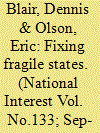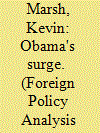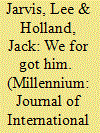| Srl | Item |
| 1 |
ID:
133631


|
|
|
|
|
| Publication |
2014.
|
| Summary/Abstract |
America's cumbersome approach to interagency operations in the field urgently needs reform, centered around more powerful ambassadors and coordinated in-country policy design.
SINCE THE 9/11 attacks, the United States has waged major postwar reconstruction campaigns in Iraq and Afghanistan and similar but smaller programs in other countries that harbor Al Qaeda affiliates. Continued complex political, economic and military operations will be needed for many years to deal with the continuing threat from Al Qaeda and its associated organizations, much of it stemming from fragile states with weak institutions, high rates of poverty and deep ethnic, religious or tribal divisions. Despite thirteen years of experience-and innumerable opportunities to learn lessons from both successes and mistakes-there have been few significant changes in our cumbersome, inefficient and ineffective approach to interagency operations in the field.
|
|
|
|
|
|
|
|
|
|
|
|
|
|
|
|
| 2 |
ID:
133587


|
|
|
|
|
| Publication |
2014.
|
| Summary/Abstract |
This study examines the decision-making process leading to President Barack Obama's decision to order a troop surge in Afghanistan in December 2009. I analyze the decision-making process according to the precepts of the bureaucratic politics model and conclude that the bureaucratic politics model provides a compelling and descriptively accurate account of the Afghanistan surge decision-making process. Actors' policy preferences were influenced by consideration of bureaucratic role and position within government, significant examples of political activity occurred throughout the strategy review, and the ultimate decision was a political compromise.
|
|
|
|
|
|
|
|
|
|
|
|
|
|
|
|
| 3 |
ID:
133553


|
|
|
|
|
| Publication |
2014.
|
| Summary/Abstract |
This article explores how the death of Osama bin Laden was narrated by the Obama administration between the night of his killing and the 2012 State of the Union address. Three aspects of this unfolding story, in particular, are explored: i) descriptions of the operation itself; ii) constructions of bin Laden's life and character; iii) accounts of the significance and likely consequences of his killing. The article argues that the narration of these events was characterised, first, by considerable discursive continuity with the war on terrorism discourse of George W. Bush, and, second, by a gradual removal or 'forgetting' of bin Laden and the circumstances of his death. Each of these dynamics, we argue, contributed to the legitimisation of his killing, demonstrating the importance of narrative remembrance and forgetting alike for the conduct and justification of liberal violence.
|
|
|
|
|
|
|
|
|
|
|
|
|
|
|
|